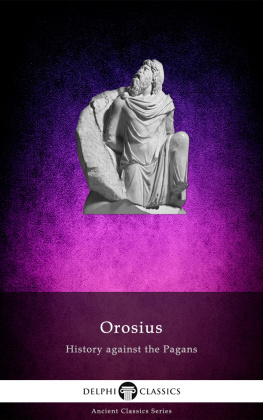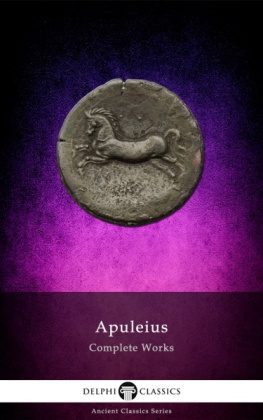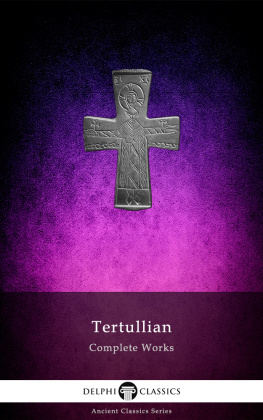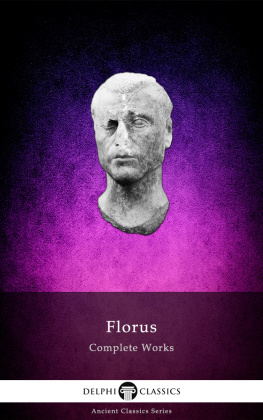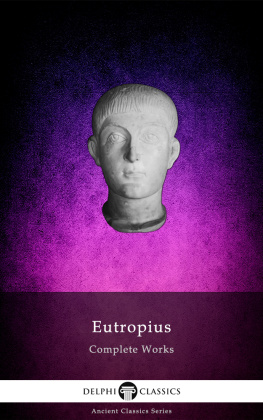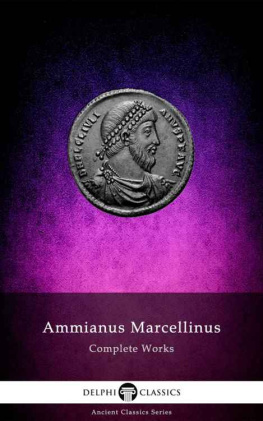The Collected Works of
OROSIUS
(c. 375-c. 420 AD)

Contents

Delphi Classics 2022
Version 1

Browse Ancient Classics







The Collected Works of
PAULUS OROSIUS


By Delphi Classics, 2022
COPYRIGHT
Orosius History against the Pagans

First published in the United Kingdom in 2022 by Delphi Classics.
Delphi Classics, 2022.
All rights reserved. No part of this publication may be reproduced, stored in a retrieval system, or transmitted, in any form or by any means, without the prior permission in writing of the publisher, nor be otherwise circulated in any form other than that in which it is published.
ISBN: 978 1 80170 099 3
Delphi Classics
is an imprint of
Delphi Publishing Ltd
Hastings, East Sussex
United Kingdom
Contact: sales@delphiclassics.com

www.delphiclassics.com
The Translation

Braga, the capital of the northwestern Portuguese district of Braga Orosius most likely birthplace

Another possible birthplace of Orosius: Tarragona, a port city located in northeast Spain on the Costa Daurada by the Mediterranean Sea. In his Histories Orosius talks of Tarraconem nostra (our Tarragona).
History against the Pagans (c. 416)

Translated by Irving Woodworth Raymond, 1936
Paulus Orosius (c. 375-c. 420 AD) was a Roman priest, historian and theologian, and a student of Augustine of Hippo. He wrote three works, of which the most important is Seven Books of History against the Pagans , considered to be one of the books with the greatest impact on historiography during the period between antiquity and the Middle Ages. Part of its importance comes from the fact that the author clearly demonstrates his historiographical methodology. The book is a historical narration focusing on the pagan peoples from the earliest time up until the time the author was alive. It is not possible to be certain as to when the text was written, as there is no single theory that is unanimously accepted by historians. The most common estimate places the drafting to c. 416.
The principal aim of History against the Pagans is to present a universalist history with an apologetic and providentialist character, comparing the pagan past with a Christian present, through their followers, their actions and their geographical location. The books origin was a response to Augustines express desire for a work that would complement his De Civitate Dei a history focused on the pagan races. Orosius objective was to compose a work that could prove that Romes decadence and its recent sacking by Alaric I in 410 was not a result of its conversion to Christianity. The author wished to show that the world had improved since the introduction of Christianity, rather than declined as others had argued. In response to those that pointed to contemporary disasters, he simply argues that other disasters occurring before Christianity were much worse. The work, a universal history of the calamities that have happened to mankind, was the first attempt to write the history of the world as a history of God guiding humanity.
Throughout the seven books that comprise History against the Pagans , Orosius introduces several new methods and he also uses others that reprise the traditional methods of Graeco-Roman historiography. Orosius never offers a negative image of the Pagans, being true to the traditions of the Graeco-Roman historians of that time, who always tried to give a positive impression of their enemies. Orosius employs the so-called succession of the four world empires theory throughout the text, which traces world history based on the premise that out of the ruins of one great civilisation another arises. His theory is based on four historical empires, Babylonia, pagan Rome, Macedonia and Carthage, with a fifth empire, that of Christian Rome as the inheritor of all these. During the narration of History against the Pagans , the four empires develop in the same way and there are a number of striking parallels between them that are markedly different from Rome, which Orosius praises.

Saint Augustine by Sandro Botticelli, Ognissanti Church, Florence, 1480 Orosius History against the Pagans was directly influenced by Augustine of Hippo.
CONTENTS

The Sack of Rome by the Visigoths on 24 August 410 by J-N Sylvestre, 1890
BOOK I.
Preface

I HAVE OBEYED your instructions, blessed Augustine, and may my achievement match my good intentions. I am not at all certain, however, that I have done the work well. [2] You, indeed, have already assumed the burden of judging whether I was capable of doing what you requested, but I am content with the evidence of obedience alone, if I have really done justice to that obedience by my will and my effort. [3] So on a great and spacious family estate many different animals are able to help in the work of the estate, yet the care of the dogs is a particular concern. For these animals alone are so endowed by nature that they are driven on instinctively to do the things in which they are trained; through some inborn spirit of obedience they are held in check only by their fear of certain punishment, until the time when they are given permission, by word or sign, to do as they please. [4] Indeed they have qualities peculiarly their own, so superior to those of brutes that they approach those of human beings, that is, they distinguish, they love, and they serve. [5] When they distinguish between masters and strangers they do not really hate the strangers whom they attack but rather are zealous for their masters whom they love; in their attachment to their master and home they keep watch, not because they are so disposed naturally, but because they are inspired by a love filled with anxiety. [6] Hence, according to the mystic revelation in the Gospels (Matt. 15.27), the Canaanite woman was not ashamed to mention, nor did our Lord disdain to hear, that little dogs were eating the crumbs under their masters table. [7] Nor did the blessed Tobias, following the guidance of an angel, scorn to have a dog as his companion (Tobit 5.16). [8] Therefore, since the love that all have for you is in my case united with a special love, I have willingly obeyed your wish. My humble self owes all that I have accomplished to your fatherly advice, and my entire work is yours, because it proceeds from you and returns to you, so that my only contribution must be that I did it gladly.
Next page
